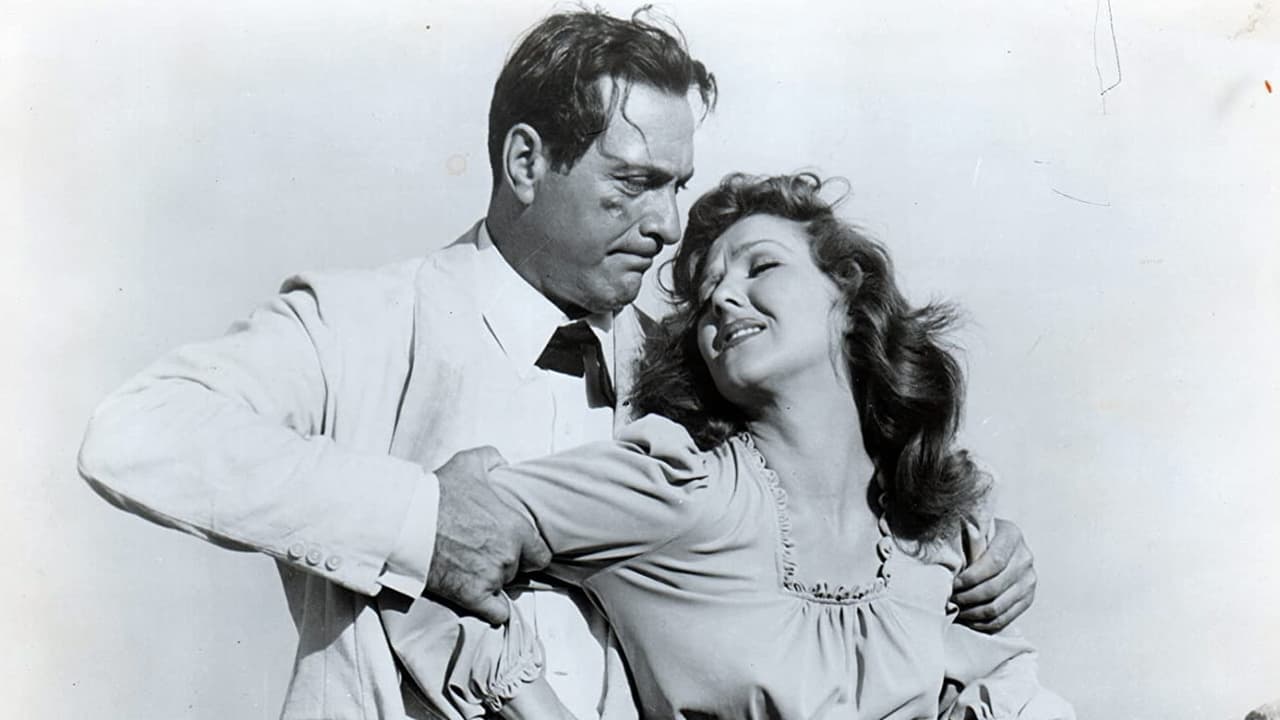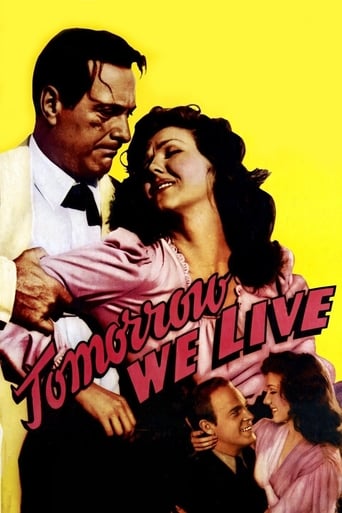

not as good as all the hype
... View MoreThis movie was so-so. It had it's moments, but wasn't the greatest.
... View MoreBy the time the dramatic fireworks start popping off, each one feels earned.
... View MoreThere's a more than satisfactory amount of boom-boom in the movie's trim running time.
... View MoreRicardo Cortez and Jean Parker horrible copy from Alpha--way too dark and blurry 2 Samuel 1:27 says "How the mighty have fallen" and this is an often quoted phrase. In the case of Ricardo Cortez and "Tomorrow We Live", it is very fitting. That's because in the early part of his career, Cortez was a hot commodity in Hollywood--having starred in such notable films as the first "Maltese Falcon" in 1931 and receiving top billing over Greta Garbo in "Torrent" in 1926. However, his career never really reached the heights after this and his career was a very slow downward spiral--resulting, by 1942, in him starring in some very low-budget B-movies. As for Cortez, this actually turned out to be a blessing, as he soon retired and moved into a Wall Street job and made a small fortune! So, although his career had definitely fallen by the 40s, it all worked out well for everyone--everyone except for audiences hoping to see him in good films! As "Tomorrow We Live" began, I cursed myself for watching this Alpha Video copy. That's because Alpha never restores their DVDs at all--and often they use the lousiest of prints. And, in the case of this movie, the print is horrible! It's very blurry and dark--and looks really ugly.The film begins with a racketeer (according to one astute reviewer, Ricardo Cortez's character was based on Bugsy Siegal) noticing a nice young lady (Jean Parker). While she isn't interested (since she is a nice girl and already has a boyfriend who is in the service), Cortez isn't about to take no for an answer. Additionally, Cortez has a hold over her father--but exactly what it is the audience doesn't know. All this eventually leads to murder and a VERY heavy-handed message that equates gangsters to the fight against international fascism.So why do I give this film only a 3? Well, two main reasons. First, the message lacks subtlety and is never handled gracefully or deftly. Second, and more importantly, Cortez's character has a HUGE meltdown at the end that just comes off as silly and unbelievable. Could this movie have been better? Of course, but based on the limp plot you couldn't have done much more with this picture.
... View MoreAnother PRC quickie from Edgar Ullmer, but he threw everything and the kitchen sink into this one. The story revolves around a character called "The Ghost" played to the hilt by Ricardo Cortez. It takes place at some lonesome outpost in the desert. The Ghost is a mysterious gangster from the east who opens a nightspot out west and begins to corrupt everything he touches. One of his victims is an old geezer played by Emmett Lynn, who once was charged with murder. The Ghost blackmails him into a black market tire scheme. (This was 1942 and tires were worth more than gold). He than sets his sights on the old timer's daughter played by an unremarkable Jean Parker, who is really in love with a soldier. Then it gets weird. The Ghost is threatened by a rival gangster called "Big Charlie". You have to wonder, how many gangsters can they possibly have out in cactus country? Let's see; we have a big shoot out between The Ghost and his gang and Big Charlie and his gang. The Ghost escapes, comes to believe he is immortal, shoots the old geezer in cold blood, and THEN swears his undying love for the daughter and wants her to run away with him. I would call that bad timing. As this unlikely scene plays out, we come to find that The Ghost is as nutty as a Snickers Bar. Meanwhile, the old geezer rolls over, shoots The Ghost and croaks on cue. The daughter calls the sheriff, declares her love to her soldier boy, and we finish up with a huge military parade of trucks, jeeps, and assorted obsolete military equipment across the desert, right past the front door of the old geezers cafe.Look, this is Edgar Ullmer. This is PRC. It was an amazing exercise. Can I say, they don't make them like this anymore. The one thing I would mention is the performance turned in by Ricardo Cortez. Most film buffs remember him as the suave gangster, the smooth operator of the 30's. This film was made slightly after his prime and, I think, he elected to, or was forced to, take another tack. In this film we initially see him in his traditional role as a rather elegant gangster. But as the film progresses, he gets loonier and loonier until, toward the end, he looks less like Ricardo Cortez and more like Zeppo Marx. This is one of a kind. Cowboy gangsters and a military parade in the same movie - and don't forget to buy your war bonds.
... View MoreIt is amazing how some poverty row productions have coherent scripts with quite a few interesting aspects which lifts them above the average fare (always provided you are interested in movies of this epoch). There is quite a lot going on during the short 63 Minutes this movie will take of your time.The heroine - a very wholesome looking Jean Parker is the daughter of the owner of a small café and gas station in the middle of the desert. Her father is involved (he operates an illegal stash of tires) with a gangster who retreated here from the East and opened a night club in the desert. It is a strange mixture of a Corleone-kind of figure and Edward Robinson's Johnny Rocco in Key Largo.The girl has to choose between the gangster and her former boyfriend who has just joined the army. The gangster knows that because of injuries which date from shootouts he will not live much longer and tries to use this as an argument for the hesitant girl to marry him. He is in trouble because some competing local gangsters (all wearing ten gallon hats) want to run him out of the place (this is also slightly reminiscent of Godfather II).The army officer boyfriend has a showdown with the gangster. He enters his snazzy office in the night club, looks around, nods in confirmation and says: This looks like Berchtesgaden, you know, where Hitler chews rugs. After this rather surprising opening he goes on to tell the gangster that he, like Hitler, will soon be a has-been and that there will be no place for guys like him in the country. It's a little like Bogart's speech in Key Largo.Oh yes, and the girl's poor father is forced by the gangster to bury a corpse in the desert. Like I said, quite a lot is going on and everything ties in nicely in the story, which is not too often the case in today's A-productions. Edgar G. Ulmer as always succeeds to create an atmosphere which helps the story along and makes this movie worth your while.
... View MoreAfter an opening sequence featuring stock footage so dark and dupey that its difficult to tell what we're seeing, the film proper begins (and lightens up to acceptable visual quality) and moves into Pop Bronson's (Emmett Lynn) desert diner. We find Pop in mid-conversation with his daughter Julie (Jean Parker, who also starred in Ulmer's BLUEBEARD) who has just dropped out of college. Pop has been sending her money for years to put her through school and he's understandably upset about her sudden, inexplicable dropout. The scene is deliberately disorienting, as it takes a while before we understand the context of their conversation. When Julie accuses her father of black marketeering (this is war time, after all), Pop gives her a vicious slap. The whole scene prepares us for an unsettling experience which the film does not deliver until it's more than half over, settling in to long soap opera conversations filmed in uninteresting master shots. We meet Ricardo Cortez, gangster owner of a desert night club, who has earned the moniker of "The Ghost" for his survival of two attempts on his life. Thirty-five minutes into this barely 63 minute movie, the guns start blazing, the camera begins to move and the editor wakes up. Julie's Army boyfriend shows up to give The Ghost a major dressing-down, comparing him to Hitler and warning him that the honest little people will soon beat his pants off. Instead of the little people, its a rival gangster who beats The Ghost nearly to death and burns down his club, driving the man mad. The film now races to a speedy, suspenseful conclusion. In his career-spanning interview with Peter Bogdanovich Ulmer described this as a horror film influenced by Grand Guignol (which it is not), but its opening scene, final 30 minutes, odd patriotic imagery and good performances from Cortez and Parker make it worth seeing for anyone interested in Ulmer's career of making something out of nothing.
... View More